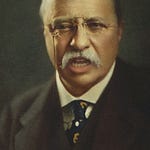Hello, I am H.L. Mencken, and I once wrote, “Off goes the head of the king, and tyranny gives way to freedom. The change seems abysmal. Then, bit by bit, the face of freedom hardens, and by and by it is the old face of tyranny. Then another cycle, and another. But under the play of all these opposites there is something fundamental and permanent — the basic delusion that men may be governed and yet be free.” Today, I will unpack the meaning of these words, how they applied in my time, and why they remain strikingly relevant today. When I penned this observation, I was reflecting on the cyclical nature of political power and governance throughout human history. In every age, society reaches a breaking point where tyranny can no longer be tolerated. Kings are overthrown, dictators toppled, and revolutions proclaimed. These moments of upheaval often feel like monumental victories for freedom, as if the shackles of oppression have been permanently cast off. In my time, the world was still grappling with the aftermath of such revolutions—the American and French Revolutions, the rise of industrialized democracy, and the promises of liberty, equality, and justice. But I observed that freedom achieved through revolution is rarely permanent. Over time, the very systems designed to protect liberty begin to calcify. Leaders become entrenched in power, institutions grow self-serving, and the ideals of the revolution are slowly replaced by pragmatism, bureaucracy, and control. The face of freedom hardens, losing its youthful ideals, and eventually resembles the very tyranny it sought to overthrow.
Playback speed
×
Share post
Share post at current time
Share from 0:00
0:00
/
0:00
Transcript
Off goes the head of the king, and tyranny gives way to freedom. The change seems abysmal. Then, bit by bit, the face of freedom hardens, and by and by it is the old face of tyranny. H.L. Mencken
Dec 07, 2024
Timeless Quotes: A Journey Through Enduring Wisdom (private feed for hase@peachwiz.com)
Timeless Quotes: A Journey Through Enduring Wisdom (private feed for hase@peachwiz.com)
Timeless Quotes: A Journey Through Enduring Wisdom (private feed for hase@peachwiz.com)Listen on
Substack App
Spotify
RSS Feed
Recent Episodes










